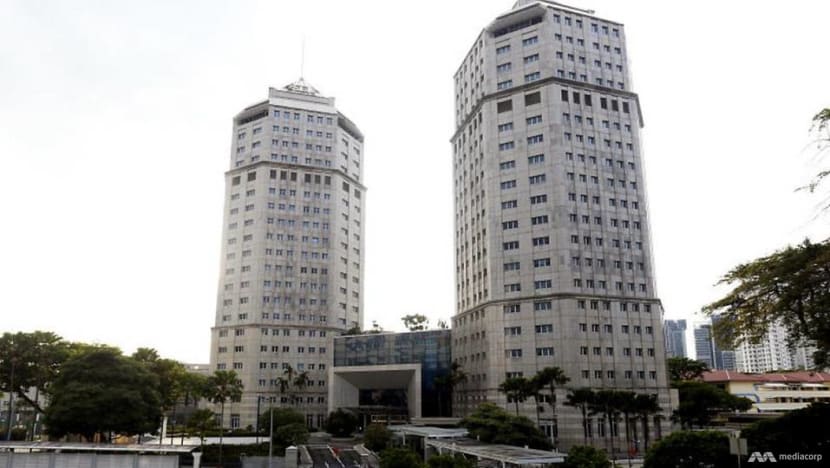Student detained under ISA released on restriction order, enrols for post-secondary classes

The Ministry of Home Affairs headquarters in Singapore. (File photo: TODAY)
SINGAPORE: A student who was detained under the Internal Security Act (ISA) for two years over his support for the Islamic State was released on a restriction order this month and has since enrolled for classes at a post-secondary institution.
The teenager was released in January after making “good progress” in rehabilitation, said the Internal Security Department (ISD) on Monday (Jan 24).
He was detained under the ISA in January 2020 at the age of 17 after being radicalised by a “foreign online contact”, said the ISD.
The teen was willing to assist the Islamic State in its terrorist activities, including its online propaganda efforts, said the department.
He also “staunchly believed in ISIS’ violent cause, despite the demise of its so-called caliphate in Syria and Iraq”.
RELIGIOUS REHABILITATION
During his detention, the teen, whose identity was not revealed, worked with a psychologist to reduce his vulnerability to radical influences, said ISD.
He also had monthly sessions with a religious counsellor from the Religious Rehabilitation Group (RRG).
The counsellor helped to improve his religious knowledge and “corrected his misguided belief in the radical ideologies he had imbibed” from the Islamic State’s propaganda, said ISD.
In the process, the teen “gained an appreciation of Singapore’s multi-racial and multi-religious context”, the department said.
ONE OF THE “CHOSEN ONES”
The teen was 15 years old when he was first investigated by ISD in September 2017.
He was investigated for posting defaced images of President Halimah Yacob on social media and “calling for the Islamic State in Iraq and Syria (ISIS) to behead her”, said ISD.
Investigations at the time found that he was radicalised by pro-Islamic State propaganda in social media channels and groups. He was introduced to these by someone he met online.
The teen “felt proud that he was given access to what he thought was exclusive ISIS content in a private chat platform”, said ISD in a previous release.
“He saw himself as ‘cool’ and one of the ‘chosen ones’, and this boosted his self-esteem and sense of belonging.”
He became convinced that the Islamic State’s actions were “righteous” and its fighters were “true Muslims” and the “true Islamic army”, said ISD.
“He also adopted the group’s us-versus-them worldview and considered Muslim public officers and politicians who are working for a non-Muslim government, such as President Halimah Yacob, apostates.”
ISD said that he was not dealt with under the Internal Security Act at the time due to his age and the assessment that he did not post an imminent threat.
He was counselled and “efforts were made to steer him away from the radical path”, but he remained staunchly supportive of the Islamic State in spite of those efforts, said ISD.
He was subsequently arrested and detained under the Internal Security Act in January 2020.
CONTINUING EDUCATION
During his detention, arrangements were made for the teen to continue his studies and sit for national exams. This was to ensure he would be able to reintegrate into mainstream society upon his release, said ISD.
The department worked with the teen’s school, and he also received extensive tutoring support from RRG volunteers who are Ministry of Education-trained teachers.
He scored four distinctions in his GCE Normal (Technical) Level exams in 2020 and passed all subjects in his GCE Normal (Academic) Level exams last year.
Since his release on a restriction order earlier this month, the teen has enrolled in a course at a post-secondary institution, said ISD.
The restriction order requires the teen to abide by several conditions and restrictions, such as not changing residence or employment or travelling abroad without the approval of the director of ISD.
He will also need the director’s approval to access the Internet or social media, issue public statements, address public meetings or print, distribute, contribute to any publication and hold office in or be a member of any organisation.
REHABILITATION EFFORTS
Highlighting the case as an example of the RRG's role in rehabilitating detainees, Home Affairs Minister K Shanmugam said that the teen, referred to as "Daniel", made "strong progress" under the group's guidance over the last two years.
"He has now found his purpose – to study hard, find a good job, provide for his family when he sets up a family, and contribute to society," said Mr Shanmugam, who is also Law Minister.
"This rehabilitation journey of 'Daniel' and other detainees shows what the hard work you do and the dedication that you give, can make a difference to people’s lives."
It also highlights the "multi-stakeholder approach" that Singapore takes, he added, with the Government working with the Ministry of Education and the RRG in their efforts.
"So, we have to try and build an ecosystem of care and supervision around the detainee and his family to facilitate reintegration, and we don’t want them to get back into radicalisation," he said.
"I don’t think any other country puts so much effort into every single detainee."
Speaking at a seminar by RRG and the Inter-agency Aftercare Group, Mr Shanmugam noted that more than 130 Singaporeans have been dealt with for terrorism-related activities since 2002.
Of the more than 130 Singaporeans that have been dealt with, only 15 remain in detention while 26 people are still under supervision.
"If you compare it with other countries, essentially these people are detained, and the keys are thrown away," he said.
"This would not have been possible if it had been the Government that had been doing it. It has been possible because of your efforts – the RRG and Inter-agency Aftercare Group."
Editor's note: This story has been amended following a correction from the Ministry of Home Affairs regarding the number of people who have been released.














